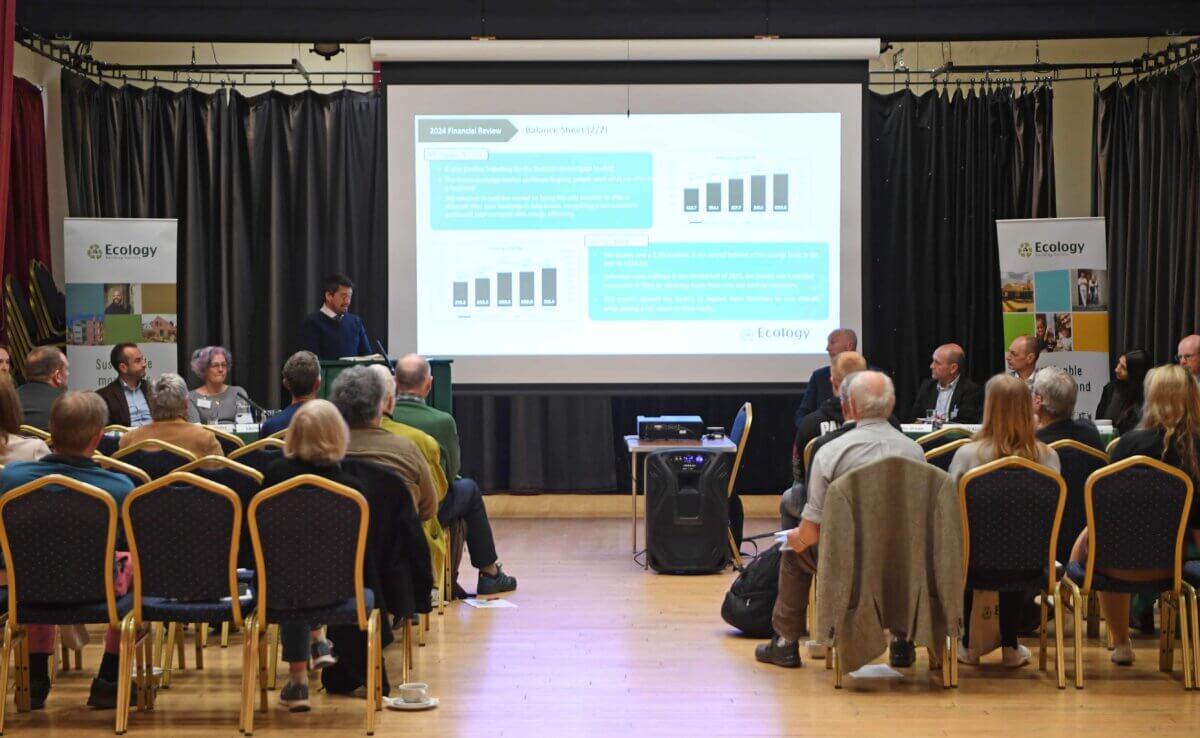Ask the Directors 2018

During the ‘Ask the Directors’ element of our AGM and Members’ Meet-up, which was held on Saturday 28 April in Birmingham, Directors responded to questions from the floor as well as pre-submitted questions from members – here are some of the Q&As:
Could the Society investigate alternative providers of auditing services more in line with our values? How do the directors justify the re-election of KPMG?
We ask our members to authorise the reappointment (or selection of a new) auditor each year, at the AGM and the Audit Committee leads on recommending the auditor
We review the provision of audit services periodically and last carried out a formal tendering process 12 years ago
Given the regulated nature of the work of building societies, there are very few audit firms with the required specialist skills to choose from. At present, this would be one of the ‘big four’ firms (Deloitte, Ernst & Young, KPMG and PwC).
We work with two of these firms – KPMG as external auditor, and Deloitte as internal auditor; we cannot use the same firm for both audits.
The rules on compulsory retirement from an external audit position have changed and mean KPMG will have to stand down, at the latest, after the 2020 audit.
When resources permit and, in advance of 2020, we will undertake a formal review of both internal and external audit so that the choice is extended as far as possible.
In the remuneration report, you mention that the ratio between the highest and lowest basic salary has been increased to 8. What was it increased from? Why was the increase considered necessary given that the current ratio is 5.11? Are there plans to increase the higher salaries up to the limit?
Ecology’s basic-pay ratio policy previously stated that no basic salary should exceed five-times the lowest full grade available. In January 2017, the maximum pay limit increased to a multiple of eight-times the lowest full grade salary.
We have a long standing commitment to the principles of fairness and transparency for remuneration. Our approach is to reward our staff in line with their experience, expertise and overall contribution to the Society as well as the general marketplace. We’re an accredited Living Wage employer and have been awarded the Pay Compare Mark which recognises our transparent approach to remuneration by publishing our actual pay ratio (5.11:1 in 2017).
At the 2016 AGM we informed members that we would review how we set Executive remuneration including our long standing commitment to a ‘fair pay’ policy that no basic salary will exceed a limit of five times the lowest full grade available. This reflected concerns that the level set for this maximum pay limit could impact on our ability to recruit staff with the appropriate skills and experience that we require in order to continue growing in an increasingly complex regulatory environment such as the implementation of the Senior Managers’ Regime.
Our review looked at a range of considerations including ethical pay best practice and benchmarking against similar organisations, which included external advice from HR specialists with extensive experience of working with the co-operative and mutual sector. We concluded that a revised maximum pay limit of eight times would, over time, allow Ecology to attract staff with the skills and experience sufficient to support our requirements, whilst still ensuring that we are aligned to best ethical practice.
Before implementing the updated pay policy, we sought members’ views via the Society’s Ethics Panel; the majority of Ethics Panel respondents supported an increase of the pay ratio to eight-times or more.
The new ratio has been designed to give us flexibility for the longer-term, rather than reflecting any immediate plans for significant increases to higher salaries.
The revised policy was included in the Remuneration Report which was approved by members at the AGM in 2017.
The pay-gap is 8:1 before bonuses etc. What is the gap after bonuses? How do the directors propose to close the latter gap?
Although Ecology’s maximum pay ratio limit is 8:1, the actual ratio currently stands at 5.11:1 (at 31 December 2017).
All colleagues are eligible to participate in Ecology’s performance-related pay scheme. Performance-related pay is a means of rewarding all staff for the achievement of key objectives and so supports the strong performance of the Society. Our performance-related pay scheme is carefully monitored to ensure it remains in line with our stance on fair and transparent remuneration. At present, there are no plans to change the Society’s approach to how it awards performance-related pay.
What is Ecology’s Gender Pay Gap?
Given our size (with less than 250 employees – we have 28 (at 31 December 2017) Ecology does not fall within the category of mandatory gender pay gap reporting.
We don’t believe that the current methodology used for the mandatory reporting approach is particularly meaningful and can be problematic for small organisations such as Ecology, where even one change of gender in a single role could have a significant impact on the figures due to the small sample size.
We do have pay scales in place within the Society and roles are benchmarked and paid against this framework irrespective of the gender of the role holder.
In line with our commitment to openness and transparency, we’re currently exploring a range of more meaningful metrics with appropriate supporting narratives to reflect our diversity and will update further in due course.
All the non-executive directors seem to have received a pay rise apart from the one woman. Does this mean there is a gender pay gap?
All directors are remunerated at an equal daily rate, which is based on the Chief Executive’s salary.
While committing a minimum of 36 days per year, in some years, certain directors will take on additional responsibilities (and so work additional hours/days), whereas others may reduce the number of hours worked.
This means that the total remuneration for each director can fluctuate year-by-year.
This is a reflection only of the total hours they have worked for the Society, not in any difference to the daily rate of pay received by individual directors.
I was struck by the lack of diversity in terms of gender and ethnicity for the Directors’ elections. Whilst I find the current board composition of 6 men and 3 women promising, I would like to hear what plans Ecology Building Society has to improve board diversity as a whole?
With regards to diversity more generally, all Board appointments are made on merit, in the context of the skills, independence and experience that the Board requires as a unit to remain effective.
In terms of gender diversity specifically, realising the benefits of gender diversity the Board endeavours (subject to the aforementioned considerations) to maintain a female representation of at least 33% of its composition. The Society has, in its history, achieved a figure of 50% at various times, and has had two female Chairs.
With regards to female representation amongst the candidates for election/re-election this year, Directors who wish to continue serving on Ecology’s Board must stand for re-election every three years.
Although there are currently three female Directors on the Board, none of these three Directors are required to stand for re-election in 2018. They will all continue to serve on the Ecology Board over the coming year.
Would it be possible to say how many hours the non-executive directors spend on work for Ecology and what the work is?
All non-executive directors must work a minimum of 36 days for Ecology. Some directors take on additional responsibilities and so work more than this minimum.
More details about the responsibilities of non-executive directors can be found on pages 18-21 of our 2017 Annual Report and Accounts which also includes a table showing Board members’ committee membership and attendance record.
These meetings can require considerable preparation. The Board meeting, for example, requires the compilation of a Board pack which is typically upward of 500 pages. Non-exec directors must also partake in relevant training and development activity to ensure that they are up-to-date with competency requirements.
Why aren’t directors expenses published in the Annual Report?
We reimburse the actual cost of any expenses incurred by Directors in the course of their Ecology duties (such as travel and subsistence) at the same rate (and within HMRC guidelines) as any Ecology employee.
As this doesn’t form part of their remuneration we do not include this information in the Directors’ remuneration report (page 11 of the Annual Review or page 22 of the Annual Report and Accounts).
Congratulations to Paul Ellis for staying with the company for 25 years. Is he considering retirement and what plans dos the Board have in place to find a suitable replacement?
Following his 25-year anniversary in 2017, Paul Ellis is continuing to lead the Society as CEO and there are no changes planned at this time.
The Board is always alive to the potential for changes in the Society’s leadership and takes this into account as part of the succession planning process.
As ever, we would share, as soon as possible, any changes with regards to the leadership of the Society.
What are ‘disruptive technologies’ (as described in Steve Round’s, Chair’s statement)?
‘Disruptive financial technologies’ within this context refers to new technologies that change (or disrupt) the status quo in some way.
For example, Mr Round has been involved in establishing technologies to assist farmers in regions of Africa by enabling improved access to warehousing and the Exchanges; he has also been working to support the establishment of online banking systems that enable previously excluded people to have access to banking services.
While it may be an emergent term, ‘disruptive’ with regards to the role of technology within finance appears to be gaining a foothold and coming to be increasingly commonplace.
How does Ecology ensure that properties built or renovated with Ecology mortgages do not end up in the holiday let market or for other commercial use?
We put a number of checks in place. Firstly we have a clear statement in our Lending Policy that, for social and economic reasons, we do not lend for holiday lets or second homes.
In addition, our screening and controls at the underwriting stage and post completion ensure the property is not going to be used for holiday-let purposes. Traditionally, properties require specific planning permission for holiday-let use. Our manual underwriting process means we thoroughly review documents such as planning permission, energy efficiency and intended use.
It is also condition of the loan that a borrower must specifically request our permission should they wish to let out their residential property for any reason, e.g. people being posted to jobs away from home for a period.
There has been, over the years, the very rare occasion where we have provided funding for a holiday let but these have been by exception and approved based on the exceptional energy standard being achieved (e.g. Passivhaus).
Please can you explain how the London Community Land Trust mortgages are set up?
Ecology recently pioneered an innovative solution to provide mortgages for permanently affordable homes in London, which are being sold by the London Community Land Trust (London CLT) at the St Clements development in Tower Hamlets.
The CLT homes are being sold to local residents who meet certain minimum and maximum household criteria at a price linked to local earnings. In order to keep the homes permanently affordable, if the homeowners choose to move, they have to reapply the same formula based on average local incomes when they sell and this is enforced by a restrictive covenant on each of the properties. When applying for the mortgage, the applicants had to go through the same type of mortgage checks as any other applicant.
The scheme challenges the traditional mortgage market reliance on open market value for underwriting. Ecology developed a bespoke solution which takes account of homes’ permanent affordability and ensures they can lend on this type of scheme.
In very specific circumstances, if we took possession of the property and were not able to sell it to the CLT members – this seems unlikely given their long waiting list – the covenant does allow for us to sell it at full market value.
What proportion of your lending is for new build compared to renovations?
In 2017 about 68% of the lending was on new build and 10% supported renovations.
We recognise that, if we to meet our Paris commitments, we need to focus on retrofitting housing stock. In the last couple of years we have, therefore, focused much of our marketing activities on promoting our mortgages for renovations and also changed our lending criteria to make it more attractive for our borrowers. Renovations currently make-up around 20% of our mortgage pipeline which reinforces the progress we’ve made.
Historically, in the early days of the Society, the majority of our lending supported renovations and our support for new-build (including self-build) is a more recent phenomenon. This may partly reflect the reality that undertaking an energy-efficient renovation is often significantly more complicated than starting with a blank canvas on a new build. Despite this we remain committed to increasing the renovation proportion of our lending.
We have continued to support various policy initiatives to support the growth of the renovation market. For example, last year we sponsored the Superhomes open homes programme which aims to inspire more people to undertake energy-efficient renovations. We’re also engaged in a series of discussions with the Government to share our experience of providing lending for home energy-efficiency improvements. And we continue to work with our partners at organisations such as the AECB and others who are constructing fantastic training programmes for professionals including architects and building contractors to improve the awareness and quality of retrofits.
Do you require monitoring evidence to show that the actual improvement energy-efficiency improvement is being achieved?
In order to access our C-Change sustainable homes and retrofit discounts, we require borrowers to provide evidence of the energy standard achieved, such as an EPC certificate.
It is widely recognised that the expected energy-efficiency performance planned during the design process or that indicated by the EPC certificate are not always achieved. This might occur for a number of reasons including issues with the installation of the energy-efficiency measures or the way the people living in the house use energy.
While monitoring schemes are difficult to set-up, especially when people are living in the house, if a sensible and workable scheme arises, we would encourage our members to get involved.



